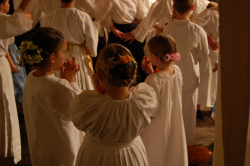The lullaby is one of the most ancient folklore genres. It doesn’t require any sort of an accompanying instrument, as it’s just a little song performed by a parent or a babysitter to help a child to fall asleep.
If you imagine this situation, a wholesome image would probably come to mind. However, the lyrics of many traditional lullabies contradict it: sometimes they sound more terrifying than comforting.
One of the most popular Russian verses goes like this:
Hushaby, hushaby,
Don’t lie on the edge of your bed
Otherwise a grey wolf will come
And bite your side.
(Баю-баюшки-баю,
Не ложися на краю,
Придет серенький волчок
И укусит за бочок.)
If this didn’t scare you, how about lullabies that actually describe the death of a child? For example, this song exists in many variations:
Hushaby,
Quickly die,
On the morning will be frost,
And you’ll go to the graveyard.
(Бай, бай, бай,
скорее умирай.
Заутро мороз,
а тебя на погост.)
And this one was recorded in early 20th century near Arkhangelsk:
Sleep, my sweet child
By the fall we’ll have another [child],
By the name-day – one more…
Today Vanyushka will die,
Tomorrow there’ll be the funeral,
We will bury Vanya
And ring the big bell.
(Спи, дитя моё мило,
Будет к осени друго,
К именинам третьё...
Седни Ванюшка помрет,
Завтра похороны,
Будем Ваню хоронить,
В большой колокол звонить.)
You may ask, “Who on Earth would sing something like that to a child?!” Well, the thing is, to people of the past, portraying the danger meant making it happen in imagination instead of real life. It’s a common folklore feature – such bizarre descriptions were supposed to scare the real danger away. Of course, they didn’t really wish for the death of their child.
Such stories may sound weird to us but at least they can make you feel lucky that you’re in your cozy home and no wolf will bite your side. Probably.




